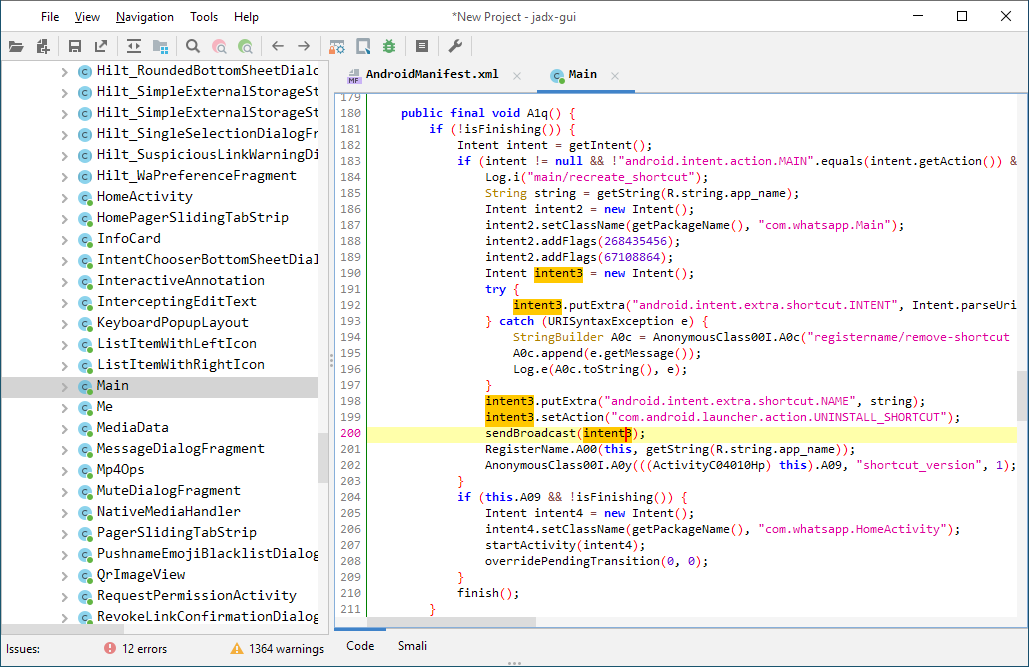JADX
jadx - Dex to Java decompiler
Command line and GUI tools for producing Java source code from Android Dex and Apk files
Main features:
- decompile Dalvik bytecode to java classes from APK, dex, aar, aab and zip files
- decode
AndroidManifest.xmland other resources fromresources.arsc - deobfuscator included
jadx-gui features:
- view decompiled code with highlighted syntax
- jump to declaration
- find usage
- full text search
- smali debugger, check wiki page for setup and usage
Jadx-gui key bindings can be found here
See these features in action here: jadx-gui features overview
Download
- release
from github:
- latest unstable build
After download unpack zip file go to bin directory and run:
jadx- command line versionjadx-gui- UI version
On Windows run .bat files with double-click
Note: ensure you have installed Java 11 or later 64-bit version.
For Windows, you can download it from oracle.com (select x64 Installer).
Install
- Arch linux
sudo pacman -S jadx
- macOS
brew install jadx
- Flathub
flatpak install flathub com.github.skylot.jadx
Use jadx as a library
You can use jadx in your java projects, check details on wiki page
Build from source
JDK 8 or higher must be installed:
git clone https://github.com/skylot/jadx.git
cd jadx
./gradlew dist
(on Windows, use gradlew.bat instead of ./gradlew)
Scripts for run jadx will be placed in build/jadx/bin
and also packed to build/jadx-<version>.zip
Usage
jadx[-gui] [options] <input files> (.apk, .dex, .jar, .class, .smali, .zip, .aar, .arsc, .aab)
options:
-d, --output-dir - output directory
-ds, --output-dir-src - output directory for sources
-dr, --output-dir-res - output directory for resources
-r, --no-res - do not decode resources
-s, --no-src - do not decompile source code
--single-class - decompile a single class, full name, raw or alias
--single-class-output - file or dir for write if decompile a single class
--output-format - can be 'java' or 'json', default: java
-e, --export-gradle - save as android gradle project
-j, --threads-count - processing threads count, default: 4
-m, --decompilation-mode - code output mode:
'auto' - trying best options (default)
'restructure' - restore code structure (normal java code)
'simple' - simplified instructions (linear, with goto's)
'fallback' - raw instructions without modifications
--show-bad-code - show inconsistent code (incorrectly decompiled)
--no-imports - disable use of imports, always write entire package name
--no-debug-info - disable debug info
--add-debug-lines - add comments with debug line numbers if available
--no-inline-anonymous - disable anonymous classes inline
--no-inline-methods - disable methods inline
--no-finally - don't extract finally block
--no-replace-consts - don't replace constant value with matching constant field
--escape-unicode - escape non latin characters in strings (with \u)
--respect-bytecode-access-modifiers - don't change original access modifiers
--deobf - activate deobfuscation
--deobf-min - min length of name, renamed if shorter, default: 3
--deobf-max - max length of name, renamed if longer, default: 64
--deobf-cfg-file - deobfuscation map file, default: same dir and name as input file with '.jobf' extension
--deobf-cfg-file-mode - set mode for handle deobfuscation map file:
'read' - read if found, don't save (default)
'read-or-save' - read if found, save otherwise (don't overwrite)
'overwrite' - don't read, always save
'ignore' - don't read and don't save
--deobf-use-sourcename - use source file name as class name alias
--deobf-parse-kotlin-metadata - parse kotlin metadata to class and package names
--deobf-res-name-source - better name source for resources:
'auto' - automatically select best name (default)
'resources' - use resources names
'code' - use R class fields names
--use-kotlin-methods-for-var-names - use kotlin intrinsic methods to rename variables, values: disable, apply, apply-and-hide, default: apply
--rename-flags - fix options (comma-separated list of):
'case' - fix case sensitivity issues (according to --fs-case-sensitive option),
'valid' - rename java identifiers to make them valid,
'printable' - remove non-printable chars from identifiers,
or single 'none' - to disable all renames
or single 'all' - to enable all (default)
--fs-case-sensitive - treat filesystem as case sensitive, false by default
--cfg - save methods control flow graph to dot file
--raw-cfg - save methods control flow graph (use raw instructions)
-f, --fallback - set '--decompilation-mode' to 'fallback' (deprecated)
--use-dx - use dx/d8 to convert java bytecode
--comments-level - set code comments level, values: error, warn, info, debug, user-only, none, default: info
--log-level - set log level, values: quiet, progress, error, warn, info, debug, default: progress
-v, --verbose - verbose output (set --log-level to DEBUG)
-q, --quiet - turn off output (set --log-level to QUIET)
--version - print jadx version
-h, --help - print this help
Plugin options (-P<name>=<value>):
1) dex-input: Load .dex and .apk files
- dex-input.verify-checksum - verify dex file checksum before load, values: [yes, no], default: yes
2) java-convert: Convert .class, .jar and .aar files to dex
- java-convert.mode - convert mode, values: [dx, d8, both], default: both
- java-convert.d8-desugar - use desugar in d8, values: [yes, no], default: no
Examples:
jadx -d out classes.dex
jadx --rename-flags "none" classes.dex
jadx --rename-flags "valid, printable" classes.dex
jadx --log-level ERROR app.apk
jadx -Pdex-input.verify-checksum=no app.apk
These options also worked on jadx-gui running from command line and override options from preferences dialog
Troubleshooting
Please check wiki page Troubleshooting Q&A
Contributing
To support this project you can:
- Post thoughts about new features/optimizations that important to you
- Submit decompilation issues, please read before proceed: Open issue
- Open pull request, please follow these rules: Pull Request Process
Licensed under the Apache 2.0 License











